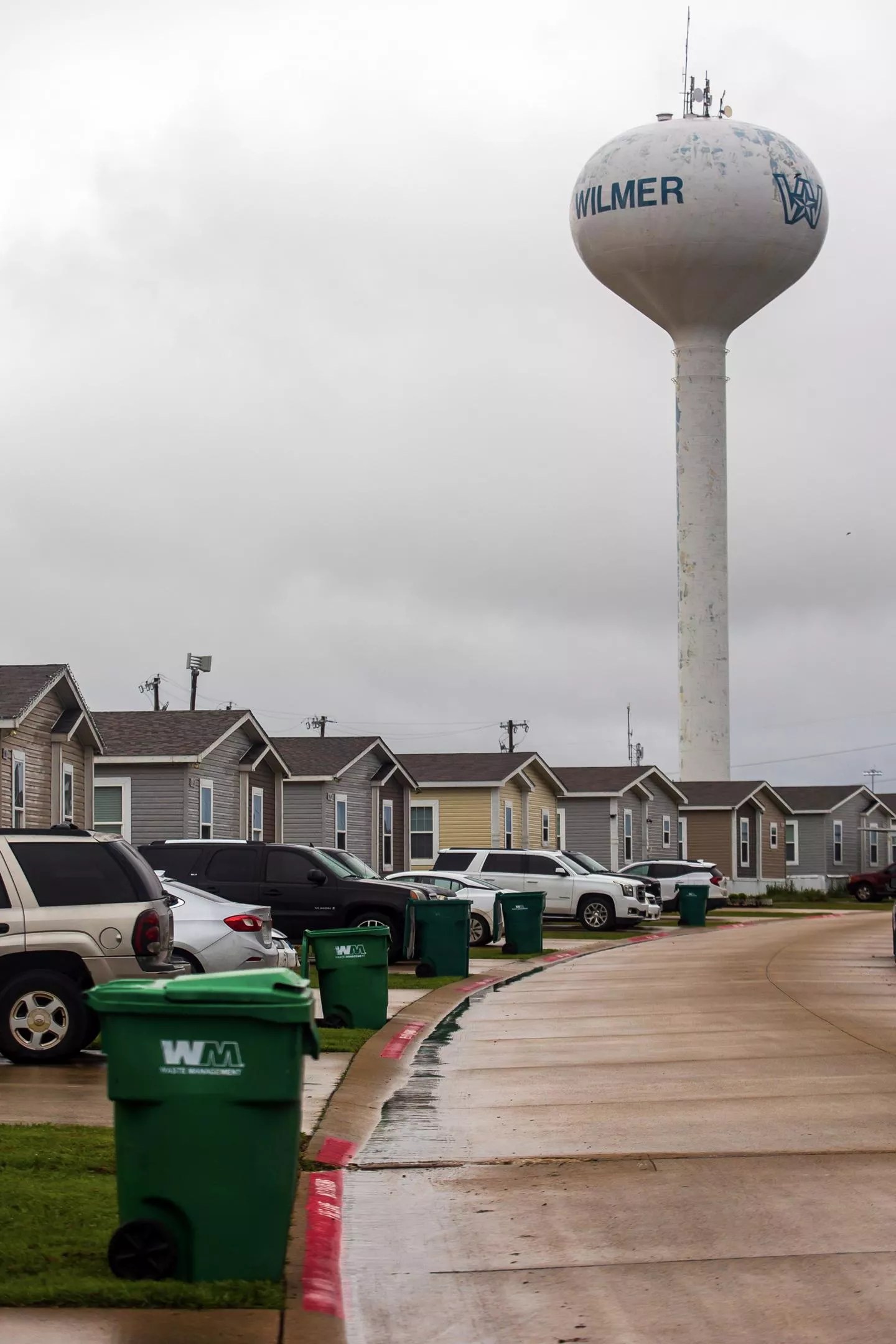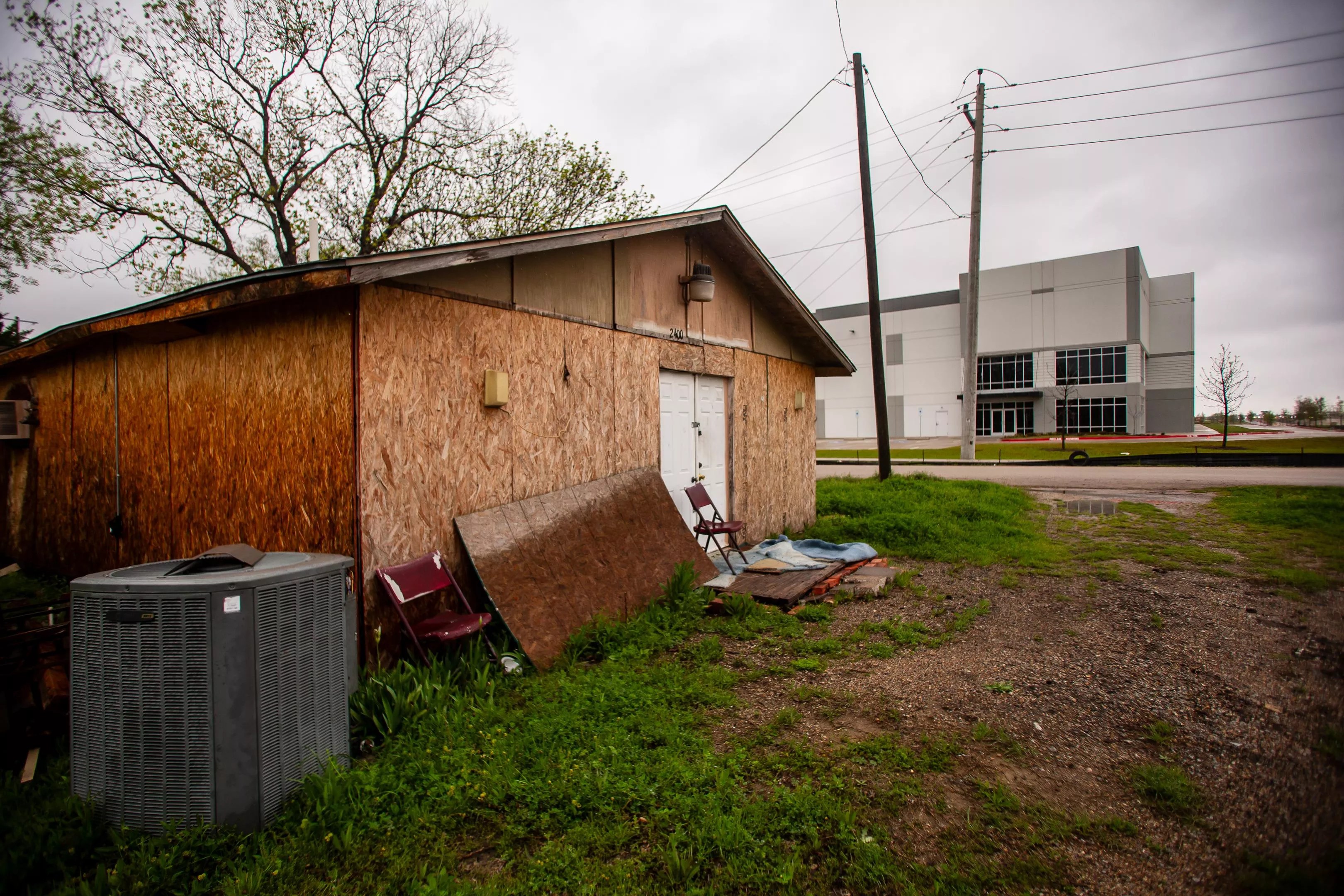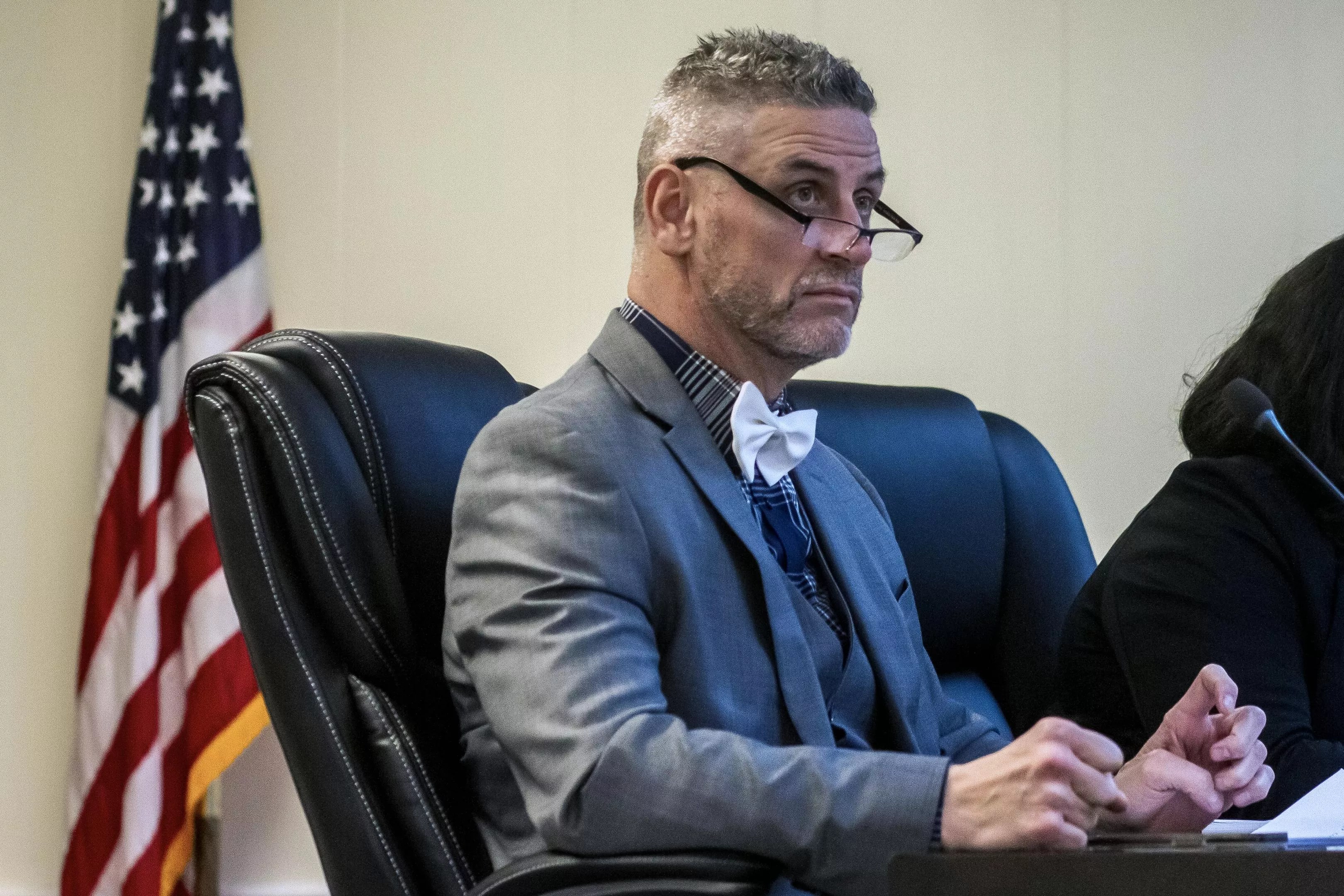
Mark Graham

Audio By Carbonatix
Glenda Hefner calls where she lives “the black hole of Wilmer.”
It doesn’t look like a black hole on the city’s planning map – more of a gray rectangle that captures her property and the one across the road from her. All around them is the city, mostly covered in warehouses: massive, flat structures, filled with tools, diapers, washing machines and other goods delivered from the nearby rail yard.
From her 2-acre property, Hefner needs to drive only a short distance down North Goode Road before she runs into the industrial behemoths that have replaced the fields of her youth in Wilmer. At about a million square feet, the facilities have been affecting the water pressure from her neighbors’ wells. They appear all around Wilmer, even right near the center of the city. They have put Wilmer “on the map,” Mayor Sheila Petta says.
Once a city of 3,000 people, Wilmer was surrounded by farmland, fields of cotton and wheat, and scores of homes like Hefner’s just outside the city’s boundaries. Many of those property owners would like to keep it that way and not pay city taxes for services such as sewer and water they’re not receiving.
Wilmer’s officials have other ideas, though, and they want those warehouses inside the city’s boundaries, so the city has gone on an aggressive annexation spree since 2008, roping in properties, often whether the owners like it or not.
Trouble is, the Texas Legislature cares very much about whether property owners want to be annexed and effectively outlawed involuntary annexation in 2019. That fact and a handful of successful lawsuits over the years haven’t diminished Wilmer’s hunger, though. And the problem for homeowners in this rural, not affluent section of Dallas County is that fighting an unlawful annexation means going to court, which takes money.
Hefner had fond memories of the roller rink in town and Cottonwood Creek where she and others played as children. Later, she would struggle to recall that fondness, in part because of certain city officials. They tried to force her property and others into the city, but they won’t compel the diesel shop next door, which is inside city limits, to finish its parking lot. She claims the exhaust from the diesel trucks and the parking lot dust have harmed her health … for 10 years.
Coincidentally or not, it has been 10 years since Hefner fought the city over involuntary annexations and won her release from city boundaries. Twenty property owners had joined her in the successful fight.. But a couple of properties did remain voluntarily inside the new boundaries.
“Now they got brand new warehouses on them,” Hefner says.

Manufactured houses sit in the shadow of the Wilmer water tower.
Mark Graham
Wilmer sits alongside a major rail corridor with easy highway access and industrial businesses nearby. This makes it an ideal location for warehouses and distribution centers and for Wilmer to sweeten the pot with generous tax abatements for new warehouses.
Some in Wilmer would prefer to see the city pursue a different style of growth. “I’d rather see 50 years of taxes on 424 rooftops than another 75% tax abatement on somebody’s warehouse,” a property owner told council members last year at a council meeting.
“I’m ready to sell my property,” she continued. “All of us on North Goode Road are ready to sell our property. But so far the developer that wants to buy our property has been ridiculous in his offer. … I am told that he is having several real estate agents call us. This week five calls to buy my house. Neighbors reported the same thing, so we’re being harassed. I’d rather see single-family homes than warehouses.”
Driven by a former mayor with ambitions to grow Wilmer into a warehousing powerhouse, the city used the state’s local government code – the laws that prescribe what smaller city governments can do – to annex nearly 140 properties in late 2022 and early 2023. It found itself enmeshed in lawsuits, perhaps because it got a little too ambitious or downright greedy in corralling new areas to its odd boundaries. (On Google Maps, the outline of Wilmer’s city limits look like a child’s drawing of a Decepticon in mid-transformation.)
The bitter fights over annexation got so bad that one litigant, Heran Patel, a property owner and CEO of a private equity firm in Dallas, became a whistleblower and faced a defamation lawsuit from the former mayor and city leaders because, as a judge later pointed out in Patel’s counterclaim, he dared to speak out on a public matter.
Using frivolous lawsuits to stifle free speech is also against the law in Texas, incidentally, even in Wilmer.
“It’s the Devil’s Den,” Hefner says of the city council. “We got the devil up there on the podium.”
“It’s the Devil’s Den. We got the devil up there on the podium.” – Glenda Hefner, Wilmer resident
Joe Aldrich says Wilmer is “about 15 miles from the big city but 50 years away from it,” where good old-fashioned cronyism and small-town attitudes “are not up to contemporary standards.”
For example, Aldrich says if you pay your water bill for the year in advance, as he had done, you’ll still get charged a late fee for not paying monthly.
Wilmer didn’t have much of a tax base, which former Mayor Don Hudson says made it difficult to get through the year. Hudson, now in his late 70s, moved to Wilmer in the 1960s after meeting and marrying a girl who grew up there. “There are good people in Wilmer, and there are some who like to keep things stirred up,” he says.
Hudson, who lived next door to Aldrich, claims the city spent years fighting Dallas County over control of the city’s extraterritorial jurisdiction, a defined buffer zone just outside a city’s borders that cities are quickly losing influence over.
Then, Dallas developer Mike Rader came to town with a 360-acre high-tech intermodal terminal – that’s a regional railcar load center – for the Union Pacific Railroad. It eventually became part of the inland port on 7,500 acres between Wilmer and Hutchins. He’d been working on the project with Union Pacific since the late 1990s, in the belief that it would set the stage for growth in the region, according to an Oct. 5, 2018, D Magazine profile.

A gleaming warehouse in Wilmer.
Mark Graham
“It took me seven years of persistence to convince the largest railroad in the United States to locate in Southern Dallas County,” Rader told D Magazine. “… This South Dallas growth has been the biggest accomplishment in my career. I’m excited to see the opportunity for more diverse growth, into technology and office, increasing the economic well-being of the area.”
In 2005, Union Pacific’s $70 million facility became the catalyst that Radar needed. It was expected to bring 30,000 jobs and millions in property taxes to the area. If it brought jobs, most workers live outside Wilmer, and the city’s property tax revenue increased from $1.5 million in 2015 to $3 million in 2023, according to the city’s budgets. The total tax levy on all properties in 2023 was $7.3 million.
Rader’s catalyst wouldn’t have been possible without city and county officials, real estate brokers and the railroad, with whom, D Magazine reported, Rader had established working relationships, increasing his land holdings and influence in the area.
Rader couldn’t be reached for comment.
As Jim Schutze reported for the Observer in November 2008, the inland port went through years of permitting, planning and politics to bring “a combination of gigantic railyards wedded to huge trucking centers tied to warehouses the size of small cities. Some of it is on the ground already, spread over thousands of acres of old goat pasture.”
And while then-Dallas Mayor Tom Leppert was pushing “governmental hamstrings on the inland port,” city leaders in Wilmer and in nearby Hutchins were “saying they and the developers are getting along grandly, and they don’t want to risk killing the golden goose,” Schutze wrote.
Hudson says that he had a good relationship with Rader, who he says was “doing his best to bring jobs to Wilmer that a lot of people wanted to help the town grow and prosper.”
“There was a time when I voted against Mike Rader,” Hudson says. “I thought the world of Mike. He was an excellent businessman.”
Hudson’s relationship was so grand with Rader and other developers that, Aldrich says, he ignored advisors and implemented a 10-year tax abatement at 85% instead of 50% for the warehouses if they were inside city limits.
“That’s a lie,” Hudson says. “Joe had to stir up shit in order to get people to read his blog and didn’t have a clue of what was going on.”
Hudson doesn’t remember what the abatement percentage was then but does recall the 10-year period.
In 2019, the abatement percentage was based on total appraised/assessed value, ranging from 25% abatement up to seven years to 70% abatement up to 10 years, according to the city’s abatement guide.
Hudson sold his 10-acre property with two trailer houses and two barns to Rader in 2006 for about $700,000 because Aldrich says the developer needed the property to complete his Sunridge Business Park, a 500-acre location for high-flow distribution centers. It’s a similar claim other property owners made to the Observer.
Hudson’s and Aldrich’s properties were down the street from Hefner’s, off North Goode Road, and the only two in that area located inside the city, Aldrich says. Hudson says there was another property on the other side of him.
In 2008, Hudson voted on the first involuntary annexations of properties along Belt Line Road that drew a lawsuit from a property owner. A general-law city like Wilmer has never had the authority to annex properties over the objections of owners. Larger so-called home-rule cities like Dallas could involuntarily annex until the Legislature reined in the practice in 2017 and 2019 because of public outcry, according to a March 2023 report by Texas Public Policy Foundation.
“Cities were using involuntary annexation to enhance revenues and conscripting people in the ETJ [Extra-Territorial Jurisdiction] and would unilaterally annex people,” says James Quintero, the director of the Center for Local Governance at the Texas Public Policy Foundation. “Now [the state Legislature has] shifted gears and is looking at ETJ abolishment and also balancing the scales with disannexation. The ETJ concept is unhelpful.”
But Wilmer was using a section of the state’s local government code governing smaller cities to “declare” property as part of the city if there were records to show it had been treated as such for 20 years and had been continuously provided with municipal services, including police protection, according to a June 2008 court document.
Trouble was, Wilmer conceded that it didn’t have any records of providing services and had also denied municipal services that included police protection twice in the five months prior to the annexation ordinance council had passed in early April 2008.
Aldrich says he started the website Wilmer Citizen because of Hudson’s shenanigans, and people in the area started sharing their ire with city leaders over their golden goose relationships with developers.
It had gotten so contentious that one developer, Xebec, threatened local environmental activist Lorrie McDonald with litigation and sent a cease and desist letter for her to quit participating in public debate over 95 acres on Belt Line Road that the California-based company was determined to get council to annex voluntarily, according to a Sept. 10, 2008, report by the Wilmer Citizen.
“So would anyone be surprised if there was a mafia hit? No. Would anyone be surprised if a mother in law was held hostage? No, some may not want her back. But the serious truth here is that you do run a danger of things happening to you or your property for speaking out against those in power. … Now they are trying to stop free speech. Are we now to be censored for speaking out against something we believe is wrong for the city[?]” wrote an anonymous commenter on the Wilmer Citizen site.
“I don’t like it when developers court the same people like Hudson,” McDonald says. “When they court our people and when they’re courting our politicians, they are doing favors for them and having parties for them. I don’t like that. That’s not right. You’re not serving the community.”
Aldrich has always sympathized with property owners but points out it could be worse: they could be dealing with 6,000-home master-planned communities like other cities in North Texas.
“On the other hand, the warehouses are good neighbors,” he says. “They don’t live there, don’t vote and participate in elections. But they don’t look very great, a bunch of big boxes all over the place.”

Jeff Steele was appointed the mayor of Wilmer after the role was vacated in fall 2008.
Mark Graham
Jeff Steele has been called many names over the years.
He was known as “Dr. Honky Tonk” in his wife’s country and western band and the “devil on the podium” not long after he took office as mayor in November 2008, appointed by the city council to fill a vacancy. He promised to bring transparency back to City Hall.
Hudson had resigned as mayor in early October 2008 before his term ended.
“I never done anything I’m ashamed of as mayor,” Hudson says. “I understand that when you take people from the county and annex them into the city, it creates new taxes. But I also understand why they’re upset about it. I would be, too.”
Steele’s term as mayor would mirror Hudson’s, and with similar results.
Like Hudson did in April 2008, Steele as mayor voted to use the local government code to initiate involuntary annexations along Belt Line Road and North Goode Road in June 2010, including Hefner’s property.
Hefner credits Billy Joe Wickliffe, a former council member, with bringing nearly two dozen property owners together in 2010 as part of a lawsuit to stop the city’s involuntary annexation of 50 tracts.
City attorney Michael Halla, who had to settle the 2008 lawsuit, also had to settle the late December 2010 lawsuit and deannex the properties. But in Wilmer’s case, it doesn’t matter if he loses. As property owners pointed out, Wilmer and the developers interested in the land still win since the majority of property owners who have been involuntarily annexed over the years couldn’t afford to hire an attorney to stop the city.
“As much as I would like to talk to you about the boundary adjustments that the City of Wilmer exercised under authority of [the local government code] , we are still in litigation so any comment would be premature,” Steele wrote in an early March email to the Observer. “You can direct inquiries to the City Attorney Mike Halla.”
We did. Halla didn’t respond.
The late December 2010 lawsuit discussed that when a city like Wilmer annexes a bunch of land, the ETJ naturally expands, subjecting new areas to the possibility of annexation – yet the city of Wilmer was also being sued by the city of Ferris for “never properly annexing many of the areas adjacent” to Wilmer. It was a lawsuit Wilmer settled in late March 2014, establishing a line that divides the adjoining and future territory. One of the points made in the case was that Wilmer was using illegal annexations to extend its grasp of more land, building a house of cards made of one improper annexation after another.
“As such, this will tend to create situations in which subsequent annexations become themselves invalid because state law is quite clear that annexations which create ‘islands’ which are not directly connected to the city are void,” according to the late December 2010 lawsuit.
That’s what Wilmer calls doughnut holes, pockets of the ETJ landlocked by city limits.
Steele’s tenure as mayor went down in flames because of political controversies and lack of transparency.
Steele had tried to reappoint a council member to a seat vacated by the mayor pro tem, who had resigned to spend more time with his family. “She was voted out by the citizens of this town, and she should not have been reseated,” Robert Wells, the city’s former police chief, who was fired by Steele, told The Dallas Morning News in early June 2011.
Wells was one of two new candidates who had won their council seats in the May 2011 election to reverse the course that Steele had charted. Several townsfolk gathered outside of Steele’s office in May 2011 and chanted, “The mayor must go!” according to The Dallas Morning News.
Steele had also paid city bills without council approval and was sued by another council member, which resulted in a court directing Steele “to cease interfering with the attempts by the new majority of the City Council to place items on the City’s agenda, revising and amending various City policies and ordinances.”
That same month, August 2011, Steele was also accused of slander and threats before resigning in September 2011, according to the Wilmer Citizen.

Old, unkempt properties sit across from massive new warehouses in Wilmer.
Mark Graham
After settling two court cases and enduring years of turmoil at City Hall, you might think Wilmer would have changed its ways. Instead, in 2022, it tried to involuntarily annex another 45 properties, including Hefner’s. She didn’t find out it was happening until just 48 hours before the issue came before the council that December.
Hefner immediately started calling other people, as did Patel, who had filed a lawsuit against the city a couple of months earlier due to the 2008 annexation of 12 acres on Belt Line Road he had recently purchased east of the city. He spent six months working with the county to build an RV park before the city told him about the annexation.
Hefner also wanted to sue the city. She couldn’t believe Steele had returned as a council member in 2019 and was trying to annex her property after the city had released their properties in 2013 as part of a court settlement.
The city was annexing properties involved in both the 2008 lawsuit and the 2010 lawsuit. But this time, it took care not to repeat the mistakes it had made in the previous lawsuits. It held the annexation hearings in early December 2022 and mid-January 2023. It also did its best to avoid using the phrase “involuntary annexation” on the agenda, though annexation did appear at the end.
“None of the 140 people had any notice by phone, email, mail or newspaper, and the description for the agenda item was labeled ‘Discuss and consider ordinances regarding inclusion in reference to local government code section 41.003. Case No. (M-22-62).’ How would any single person know what that means or that they are going to be annexed?” Patel asked in June when he first contacted the Observer.
Property owners outside the city limits weren’t paying attention to city agendas because they weren’t paying city taxes.
“They didn’t say anything, didn’t give me the opportunity to say whether I want to be annexed or don’t want to be,” says Cynthia Jarvis, who had inherited 100 acres between Wilmer and Ferris from her grandmother. “With cities, it is a rule that we have to be asked. I’m a real estate broker, and you have to ask to be annexed.”
Property owners also didn’t have the Wilmer Citizen to keep them updated. Aldrich says he had to shut it down in 2014 because “two council members were going to file bogus criminal charges” against him.
“These people are nuts,” Aldrich says. “I wanted to stay away from them.”
Halla had signed off on the agenda that used the local government code as the rationale for the involuntary annexations. Hefner’s attorney, Robert Miklos, who was representing 12 property owners, claimed the city had no record to demonstrate that the properties had been receiving long-standing service from the city.
Hefner and other property owners claim that whenever they called 911, they were routed to the Dallas County Sheriff’s Office. They were also paying taxes as part of the unincorporated county and were not receiving road repair, sewerage or water services from the city to justify the “inclusion.”
They were also upset that McDonald, who now serves on the Planning & Zoning Commission, lives in the ETJ off Belt Line Road but wasn’t included in the annexation.
“I’m not part of that,” McDonald says. “I’m almost down to the river. No favoritism.”
Milkos filed another lawsuit in January for eight other property owners. Three more lawsuits by 10 other property owners followed that same month, all claiming that their properties didn’t meet the criteria laid out in the local government code.
“But we couldn’t get hold of everyone,” Hefner says. “They were annexed that very night, and some of them didn’t find out about it until the next night. They couldn’t believe they’d done that to us.”

City attorney Michael Halla, who settled the 2008 lawsuit, also had to settle the late December 2010 lawsuit and deannex the properties.
Mark Graham
Patel told a reporter for NBC5 news that he was an activist for those affected by involuntary annexations shortly before a Jan. 19, 2023, council meeting to annex 100 tracts of land.
Though the Wilmer Citizen was no longer operating, a new website appeared to take its place: “Wilmer News: Exposing the Truth.” It introduces a cast of characters from the city with questionable dealings, and warns in bold lettering: “Pay Close attention to Jeff Steele and Michael Halla in this story.”
Patel also blamed Steele and Halla and claimed they had been working with Rader since the mid-2000s to bring land into the city.
As for the city attorney, Patel claimed that Halla had other reasons to encourage the city to fight lawsuits using a local government code, though that strategy had been a loser in court since 2008.
“The financial burden of his own problems has led this city attorney to essentially act in a manner that would not be in the best interest of the city,” Patel says. “Halla extending these lawsuits to the point they are at now has allowed him to continue billing Wilmer for counsel that is ultimately going to fall on another lawyer’s desk at another law firm. He is ultimately prolonging the inevitable, which is the settlement of all these suits.”
Whether Halla will even be available to represent the city in court is in doubt. In November 2021, Halla was running late to a council meeting in Ferris and was speeding at 102 mph on Highway 664 and distracted by his cellphone, according to a Jan. 9, 2023, report by FOX 4 news. At the time, Halla was a contract city attorney for Ferris and eight municipalities in the area.
DPS investigators claim Halla struck and killed Edward Beltran, 36, and his 5-year-old son Ethan. They were crossing Highway 664, nearly home from their basketball game with family members at the elementary school across the street.
Halla was arrested in early January 2023 on two counts of manslaughter. He spent a night in jail and posted the $100,000 bond. He was dropped by Ferris as city attorney and rejected a plea deal that would have sentenced him to 15 years, according to the Sept. 16 court document.
He will be heading to trial later this year.
In the September 2022 lawsuit, Patel showed that his property “was improperly added after the adoption of the Annexation Ordinance in 2008.”
He won the lawsuit in early February. He received $221,610 in actual damages and additional damages of $445 per day at 8.5% interest after Feb. 4 until the city approves his plat for the RV park, and was awarded attorney fees of $332,833 against the city.
In the Feb. 5 court document, the judge wrote that the annexation ordinance that council had passed “was null and void.”
The city filed an appeal in early March.
Patel had also gotten entangled in a defamation lawsuit by Steele, the current mayor, Shelia Petta, and former council member Candy Madrigal and the city administrator Rona Stringfellow, both of whom would later drop out of the case. They had sued him over his social media posts.
“The City attempted to make a deal requesting us to drop our lawsuit in return they wouldn’t file the personal defamation charges,” Patel wrote in a late August email to the Observer. “They are using a separate attorney for that matter. I told them they can kiss my ass, so the result is this defamation suit.”
Some of his posts were captured by Steele in a July court document: “On May 7, 2023, Patel posted a picture of Jeff Steele in the ‘Wilmer Only’ Facebook public group stating ‘Do not vote for Jeff Steele for any city council or any Wilmer positions. Ready to screw up Wilmer with more Warehouses.’ Patel declares ‘Looks like Jeff Steele should be worried about all of his illegal antics with that Shelia Petta lady will come to an end soon,” according to the July 12, 2023, lawsuit.
“I told them they can kiss my ass, so the result is this defamation suit.” – Heran Patel, Wilmer property owner
Other posts include, “Jeff Steele and all his back door deals with the inland port Development,” “your demon child Jeff Steele is now amongst people with value and integrity on the city council and he’s scared,” and Steele and another person not named “have been terrorizing this town since before 2010 and it’s slowly now coming to an end.”
Patel countered in court that the defamation suit was filed to stop him from fighting the annexation case. Since June 2011, Texas has had an anti-SLAPP law – strategic litigation against public participation – that bans the use of defamation claims as a tool to silence critics exercising free speech.
In Patel’s Feb. 6 court document, the judge reprimanded Steele and Petta for having the “gall to argue” that it was a private dispute instead of a public one. Patel’s statements “pertained to a controversy surrounding the City’s illegal and improper annexations of property and are therefore regarding a matter of public concern.”
Patel received a $16,000 check from Steele, and the defamation case was dismissed.
break
Hefner is tired of living in the black hole.

Wilmer’s warehouses sit on direct routes to Dallas.
Mark Graham
She no longer has to worry about the city annexing her. State law changed in September and now allows property owners in a city’s ETJ to file a petition with the city to remove their properties from the ETJ. In Hefner’s case, it turned her doughnut hole into a black hole and means she must continue to rely on the county for police and fire protection.
Because her attorney had filed the lawsuits prior to council’s vote in late 2022, Hefner wasn’t annexed into the city, which meant she could petition the city to release the property from the ETJ.
Of course, it doesn’t mean the city won’t try again. Laws passed by the Legislature, a string of smackdowns in court and years of political turmoil have apparently failed to discourage Wilmer’s leaders much.
Hefner’s request to have her property removed from Wilmer’s ETJ was her least expensive defense. She says her family had already spent about $1,200 on legal fees and didn’t want to keep spending retirement money to fight a lawsuit. They received the city’s blessings to remove the property from the ETJ in October.
Miklos says several of his clients have petitioned the city to be removed from the ETJ. He expected the rest of them to be wrapped up soon.
In late February, the city settled another lawsuit, but it’s still fighting a lawsuit by TK Real Properties Investments. The property owner filed suit in early January 2023, a few weeks after its land in the ETJ was annexed into the city.
Now more property owners are selling their properties and leaving the area. Aldrich says he sold his and moved last month.
Hefner was shocked to learn in March that her neighbor across North Goode Road had sold his property. “When you grow up here, most of us are either dead or gone,” she says. “I inherited this place from our parents, and I want to move and go to the lake.”
Understanding why isn’t difficult. There also isn’t much left of the Wilmer that longtime area residents had known. Most of the involuntary annexations have already taken place, and the zoning changes weren’t far behind. Unless a property owner has the money, time and energy to go to court, a judge can’t order Wilmer to back off an annexation, even if it’s invalid.
Quintero from Texas Public Policy says the property owners’ only recourse is to approach the Dallas County District Attorney’s Office or the Dallas County attorney with enough facts to initiate an investigation.
“Your DAs and county attorneys have been susceptible to local politics and too often have not been inclined to pursue charges due to the political pressure,” Quintero says. “A lot of times property owners are left without legal recourse. The Texas AG doesn’t have the authority or the resources to step in and hold cities in account. It is something that the legislation will need to remedy.”